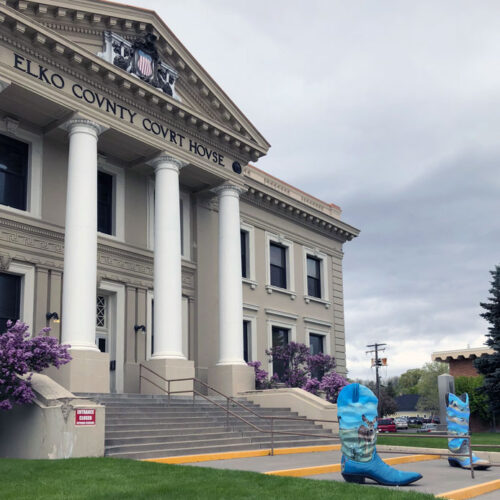Nevada creates and empowers a statewide indigent defense commission

Pleading the Sixth: After decades of public defense studies, legislative and supreme court right to counsel commissions, and numerous attempts at statutory indigent defense reform, the Nevada legislature has created a state commission to promulgate and enforce uniform standards statewide for providing indigent defense representation. Although the bill was stripped of significant appropriations at the eleventh hour, the new system is following the examples of other states that first funded and put in place commission staff and adopted standards, before appropriating state funding to assist counties with implementing those standards. Let us explain.
On June 3, 2019, the Nevada legislature created, through Assembly Bill 81, the state Board on Indigent Defense Services (BIDS) and the state Department of Indigent Defense Services. BIDS is required to promulgate standards for the delivery of indigent defense services throughout the state and to oversee the department as it monitors and enforces those standards. The department is responsible for requesting the state funding needed by counties to comply with the standards. The legislation also moves the existing State Public Defender office into the newly created department, placing it under the oversight of BIDS.
In the preamble to the bill, the State of Nevada legislature for the first time acknowledges that “[u]nder the Sixth and Fourteenth Amendments to the Constitution of the United States, the obligation to provide effective representation to accused indigent persons at each critical stage of criminal and delinquency proceedings rests with the states,” and “[a]ccordingly, it is the obligation of the Legislature to provide the general framework and resources necessary for the provision of indigent defense services in this State.” Historically and today, as explained in the Sixth Amendment Center’s 2018
report evaluating the provision of the right to counsel in rural Nevada, the state makes Nevada’s cities and counties responsible for providing the right to counsel to indigent defendants and for the funding necessary to do so. This legislation makes clear that “the State remains ultimately responsible for ensuring that such indigent defense services are properly funded and carried out,” and that “[t]he Legislature must ensure that adequate public funding is made available so that indigent defense services are provided by qualified and competent counsel in a manner that is fair and consistent throughout the State and at all critical stages of a criminal proceeding.”
A late night deal stripped the legislation of a $15 million state funding appropriation that would have immediately assisted local governments with providing indigent defense representation. The Governor’s budget contains funding adequate to create the board, establish and staff the department, and allow them to begin the work of adopting standards and regulations. The Sixth Amendment Center has seen this incremental approach work successfully in places such as Michigan, Idaho, and Utah, and it can work in Nevada too so long as the legislature remains committed to its solemn words in the preamble of this newly passed legislation.
The new state Board on Indigent Defense Services is an enormous step by Nevada both to establish state oversight of the provision of the right to counsel to indigent defendants and to protect the independence of the defense function from undue political and judicial interference.
Protecting independence
United States Supreme Court caselaw and all national standards stress the importance of independence. National standards agree that the best way to protect the independence of the defense function is for it to be overseen by a board or commission that can insulate it from both the judicial branch and the political branches of government. To do that, the members should be appointed by diverse authorities, so that no one branch of government can exert more control over the system than any other.
National standards provide that any person who is currently a judge, prosecutor, or law enforcement official should not serve on a commission overseeing indigent defense services. States often find that former judges, prosecutors, and law enforcement officers contribute valuable insights that may make them very good commission members. Increasingly, states prohibit attorneys who are compensated for appointed cases from contemporaneously serving on a commission that oversees indigent defense services, to avoid the conflicts of interest that can arise.
The Nevada legislature followed national best practice guidelines in creating the new board. BIDS will have 13 voting members and up to three non-voting members, each appointed to three-year terms and eligible for re-appointment, and the legislation calls for all of the members to be appointed and in position by July 1, 2019. The individual members are selected based on backgrounds calculated to ensure consideration of a variety of viewpoints, and they are appointed by diverse authorities:
- Two members must be Nevada attorneys in good standing, one appointed by the Governor and one appointed by the Senate Majority Leader;
- One member must have expertise in the finances of state government, appointed by the Speaker of the Assembly;
- One member must either have expertise in juvenile justice and criminal law or be a retired judge or retired justice, appointed by the Nevada Supreme Court Chief Justice;
- One member selected by the State Bar of Nevada Board of Governors must be a Nevada attorney in good standing who resides in a county with a population under 100,000, appointed by the Governor;
- Four members selected by the Nevada Association of Counties must reside in counties with a population under 100,000 and one of those members must have expertise in the finances of local government, all appointed by the Governor;
- Two members selected by the Clark County (Las Vegas) Board of County Commissioners, appointed by the Governor;
- One member selected by the Washoe County (Reno) Board of County Commissioners, appointed by the Governor; and
- One member selected jointly by the State Bar of Nevada associations that represent members of racial or ethnic minorities, appointed by the Governor.
For the non-voting members: the Nevada Supreme Court Chief Justice may designate one person to represent the interests of the court; and the Governor may appoint up to two members, one of whom must be recommended by the State Bar of Nevada Board of Governors.
Each person appointed to BIDS must have either:
- “Significant experience providing legal representation to indigent persons who are charged with public offenses or to children who are alleged to be delinquent or in need of supervision;” or
- “A demonstrated commitment to providing effective legal representation to such indigent persons;” or
- “Expertise or experience, as determined by the appointing authority, which qualifies the person to contribute to the purpose of the Board or to carrying out any of its functions.”
Board members cannot be currently serving or currently employed as: a judge, justice, or judicial officer; a legislator, state officer, or state employee; a prosecuting attorney or their employee; a law enforcement officer or employee of a law enforcement agency; nor an attorney who may obtain any financial benefit from the board’s policies. Also prohibited from serving on the board is anyone who is currently employed by: the Department of Indigent Defense Services; a public defender; or any attorney providing indigent defense services pursuant to a contract with a county.
Establishing state oversight
Among other things, BIDS is required to “[e]stablish minimum standards for the delivery of indigent defense services to ensure that such services meet the constitutional requirements and do not create any type of economic disincentive or impair the ability of the defense attorney to provide effective representation.” The board also must “[a]dopt regulations” that:
- require the new Department of Indigent Defense Services, the State Public Defender, and the counties to require compliance with BIDS regulations by the indigent defense attorneys whom they employ or contract;
- require the Department of Indigent Defense Services and the counties “to ensure, to the greatest extent possible, consistency in the representation of indigent defendants so that the same attorney represents a defendant through every stage of the case without delegating the representation to others, except that administrative and other tasks which do not affect the rights of the defendant may be delegated;”
- establish guidelines “to determine the maximum caseloads for attorneys who provide indigent defense services;”
- require “specific continuing education and experience for attorneys who provide indigent defense services;” and
- require attorneys to “track their time and provide reports” and that they do so “in a uniform manner.”
Together, the board and the department are required to “develop procedures for the mandatory collection of data concerning the provision of indigent defense services, including the manner in which such services are provided.” As BIDS deems necessary, the newly created Department of Indigent Defense Services will conduct audits and investigations “to determine whether minimum standards in the provision of indigent defense services are being followed and provided in compliance with constitutional requirements.”
In short, all attorneys who are employed, contracted, or paid to represent indigent defendants must comply with the standards, adopted through regulation, that are promulgated by BIDS. The attorneys must also report to BIDS all information required, once the procedures are in place. If a county “is not meeting the minimum standards for the provision of indigent defense services or is in any other manner deficient in the provision of such services,” the new legislation gives BIDS and the department the authority to implement and enforce a “corrective action plan” to bring the county into compliance. Counties other than Clark and Washoe can be required to transfer responsibility for the provision of all indigent defense services to the State Public Defender (which is now under the authority of the department and BIDS). This legislation, for the first time, gives the State of Nevada the ability to provide effective oversight of right to counsel services throughout the state.
What about the money?
The department prepares and BIDS approves a proposed budget for the department’s operations, which now includes the State Public Defender office. If implementation of the standards will cause any county to “expend more money than budgeted by the county in the previous budget year plus inflation for the provision of indigent defense services,” the department is required to “include the additional amount needed by the county” in the department’s next proposed budget, “to help support the indigent defense services provided by the county.” If the legislature fails to allocate the money needed by a county (other than Clark and Washoe) and included in the department’s proposed budget, the county’s board of commissioners can choose to transfer responsibility for the provision of indigent defense services to the State Public Defender. BIDS is required “to establish a formula for determining the maximum amount that a county may be required to pay for the provision of indigent defense services.”
The legislation passed in Nevada does not yet appropriate funding to aid counties in complying with the standards that BIDS is required to promulgate and enforce. Local advocates were understandably concerned when the originally proposed $15 million state funding appropriation was stripped out by a late amendment, fearing the state would impose new standards on counties without providing state funding. As passed, the legislation recognizes the reality that it will take some time for the board and the department to get up and running.
The Governor’s budget contains funding adequate to create the board, establish and staff the department, and allow them to begin the work of adopting standards and regulations. The board is intended by the legislation to be in place by July 1, 2019. The work of establishing the department, recruiting its Executive Director, and hiring department staff may begin immediately, but will inevitably take some time. All other provisions of the legislation take effect on October 1, 2019, when the department may begin collecting data and the board may begin promulgating standards and regulations. Only then can the state take its first steps in exercising its authority to oversee the provision of indigent defense services by the counties, working with the county boards of commissioners to develop their plans for complying with the state standards and regulations. At that point, the department is required to request from the legislature the state funding needed for the effective provision of indigent defense representation.
Although this incremental approach is disappointing to many local advocates and the Nevada Association of Counties, having seen the state time and again go back on promises of funding, this is exactly how state oversight and state funding contributions for indigent defense services got started in Michigan, Idaho, and Utah. In each of those states, the money came through eventually:
- The Michigan Indigent Defense Commission was created in 2013. Five years later, the Michigan legislature allocated $84.1 million in state funding to implement the commission’s first four standards. Those standards govern: attorney education and training; initial client interviews; use of investigators and experts; and the presence of appointed counsel at first appearance and other critical stages.
- The Idaho Public Defense Commission was created in 2014. The Idaho legislature allocated $11.5 million in state funding in 2019 for the commission to implement its new caseload standards.
- The Utah Indigent Defense Commission was created in 2016. Just last year, the Utah legislature allocated $5 million in new state funding for the commission and its aid to local governments in providing public counsel services. This increase is significant, as the Utah commission’s annual budget is just $1.3 million.
Where does this leave Nevada?
Ultimately, AB 81 represents a major step forward for Nevada. The state legislature has for the first time formally acknowledged its responsibility to ensure effective assistance of counsel in conformity with the federal Constitution. The new structure follows both Supreme Court case law and best practices to ensure independence, which is absolutely essential to a well-functioning indigent defense system. The Governor’s budget includes what appears to be sufficient funding to get the new state agency up and running.
Nevada was the first state to require that attorneys appointed to represent indigent defendants must be paid, placing that responsibility on counties beginning in 1875. After decades of attempted reforms and half-measures, Nevada has finally signaled that the state accepts its constitutional obligation to protect the right to counsel consistently throughout the state, particularly in the rural areas which in the past have struggled to provide adequate representation. More work clearly remains to be done, and that work becomes much more feasible with BIDS is in a position to build up accountable, independent, and effective indigent defense systems in every courtroom in the state. Stakeholders across the state must work with BIDS to develop the policies and programs that will benefit all Nevadans.


